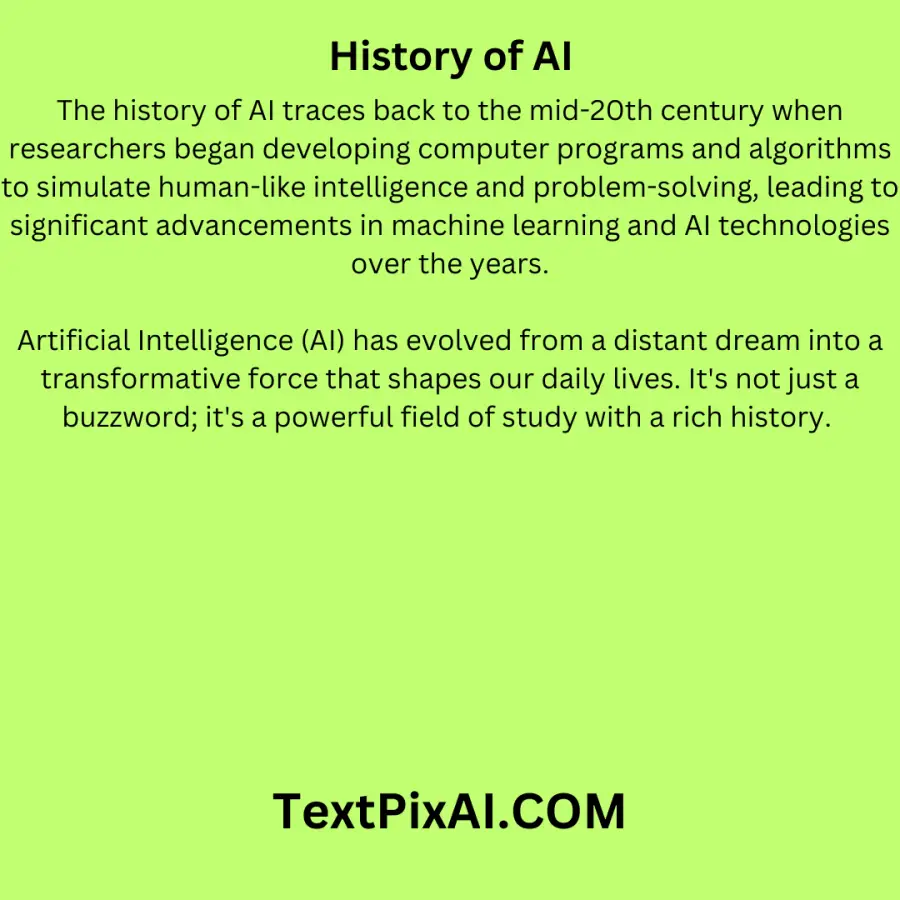History of AI (Artificial Intelligence)
Introduction
Artificial Intelligence (AI) has evolved from a distant dream into a transformative force that shapes our daily lives. It's not just a buzzword; it's a powerful field of study with a rich history. In this comprehensive exploration, we will embark on a journey through time to understand the origins, evolution, and impact of AI.
You may also like to read:
What is Artificial Intelligence (AI)
The Genesis of Artificial Intelligence
Early Concepts of Mechanical Intelligence
The notion of machines possessing intelligence dates back to ancient myths and legends. These tales often featured automata, mechanical devices created to mimic human actions. While these early endeavors were rudimentary, they sowed the seeds of curiosity about the possibility of creating machines that could think.
One of the earliest recorded examples is the Antikythera mechanism, an ancient Greek analog computer used for astronomical calculations. Although not intelligent in the modern sense, it showcased human ingenuity in creating sophisticated machines.
Alan Turing and the Birth of Computer Science
Fast forward to the 20th century, and the groundwork for AI was laid by visionaries like Alan Turing. Turing, a British mathematician and computer scientist, is celebrated for his pioneering work in the field of computing. His Turing machine, a theoretical construct, laid the foundation for modern computers and computation theory.
Turing's concept of a universal machine that could simulate any other machine's behavior sparked the idea that machines could be programmed to perform tasks that simulate human intelligence. This idea became a cornerstone of AI research.
The Dartmouth Conference and the Birth of AI
The Dartmouth Conference (1956)
The formal birth of AI as a field can be traced back to the Dartmouth Conference in the summer of 1956. This seminal event was organized by John McCarthy, Marvin Minsky, Nathaniel Rochester, and Claude Shannon. It brought together leading computer scientists and researchers who shared a common interest in "thinking machines."
The Coining of "Artificial Intelligence"
At the Dartmouth Conference, John McCarthy introduced the term "artificial intelligence" to describe the field's focus on creating machines capable of intelligent behavior. This event is often regarded as the birth of AI as a distinct field of study.
The Early Years of AI Research
The First AI Programs
In the years following the Dartmouth Conference, AI researchers developed the first AI programs. These programs were designed to solve specific problems, often using symbolic reasoning. One notable example was the Logic Theorist, created by Allen Newell and Herbert A. Simon, which could prove mathematical theorems.
However, these early AI programs had limitations. They were largely rule-based, lacked the ability to learn from experience, and couldn't adapt to new situations.
The AI Winter (1970s-1980s)
As AI research progressed, it encountered challenges and limitations, leading to what became known as the first "AI winter." During this period, AI research faced reduced funding and interest due to unmet expectations. Some of the challenges included the complexity of natural language understanding, limited computing power, and difficulties in creating intelligent agents.
Neural Networks and the Emergence of Machine Learning
Connectionism and Neural Networks
While symbolic AI dominated the early years, a new approach called connectionism emerged as an alternative. Connectionism focused on simulating the brain's neural networks and led to the development of artificial neural networks (ANNs). These networks, inspired by the brain's structure, allowed machines to learn and adapt.
The Resurgence of AI in the 21st Century
The 21st century brought about a resurgence of interest in AI, driven by several factors. One key factor was the exponential increase in computing power. With the availability of powerful GPUs and large datasets, machine learning algorithms began to shine.
Additionally, advances in deep learning, a subfield of machine learning, played a pivotal role in AI's resurgence. Deep learning models, particularly deep neural networks, demonstrated remarkable capabilities in tasks such as image recognition, natural language processing, and speech recognition.
AI in the Real World: Applications and Impact
AI in Industry
AI has found applications across various industries, revolutionizing the way we work and live. In healthcare, AI aids in early disease diagnosis and personalized treatment recommendations. In finance, it powers algorithmic trading and enhances risk management. In manufacturing, it enables automation and predictive maintenance, reducing downtime and costs.
AI in Everyday Life
AI has become an integral part of our daily lives. Virtual personal assistants like Siri (Apple), Alexa (Amazon), and Google Assistant (Google) employ AI to understand and respond to voice commands. Recommendation systems on platforms like Netflix and Amazon use AI to personalize content recommendations, enhancing user experiences.
Ethical and Societal Considerations
AI Ethics
As AI continues to advance, ethical considerations have come to the forefront. Ensuring that AI systems are fair, unbiased, and transparent is of paramount importance. AI bias, where algorithms produce discriminatory outcomes, is a significant concern. Researchers and developers are actively working on techniques to detect and mitigate bias in AI systems.
Job Displacement and Workforce Changes
The increasing automation capabilities of AI have raised concerns about job displacement. While AI may automate certain tasks, it also creates new job opportunities in fields such as AI development, data science, and AI ethics. Preparing the workforce for these changes is a crucial societal challenge.
The Future of AI and Ongoing Research
Emerging Trends in AI
The future of AI holds exciting possibilities. Quantum computing, a revolutionary technology, has the potential to dramatically accelerate AI by performing computations at speeds unattainable by classical computers. Ethical considerations, such as transparency and accountability, are gaining prominence as AI becomes more integrated into society.
Ongoing Research Challenges
Despite the remarkable progress, AI still faces many challenges. Achieving artificial general intelligence (AGI), where machines possess human-like understanding and reasoning abilities, remains an elusive goal. Researchers are exploring ways to make AI systems more interpretable, explainable, and aligned with human values.
Conclusion
The history of AI is a journey of human ingenuity and technological advancement. From ancient myths to the birth of computer science, from symbolic AI to neural networks, and from early disappointments to the current resurgence, AI has come a long way.
As we navigate the ever-evolving landscape of AI, we must embrace its potential while addressing its ethical and societal implications. The future of AI is full of promise, with emerging trends and innovations poised to shape our world in ways we have yet to imagine.
The history of AI is a testament to human curiosity and the relentless pursuit of knowledge. As we continue to push the boundaries of what AI can achieve, we embark on a journey into the future—one where machines and humans collaborate to unlock new innovations and understanding.








